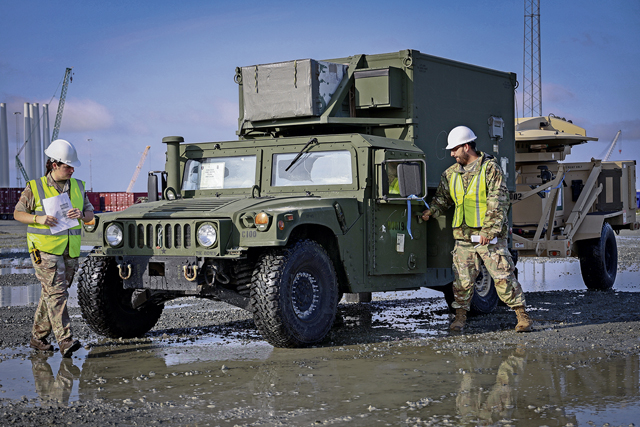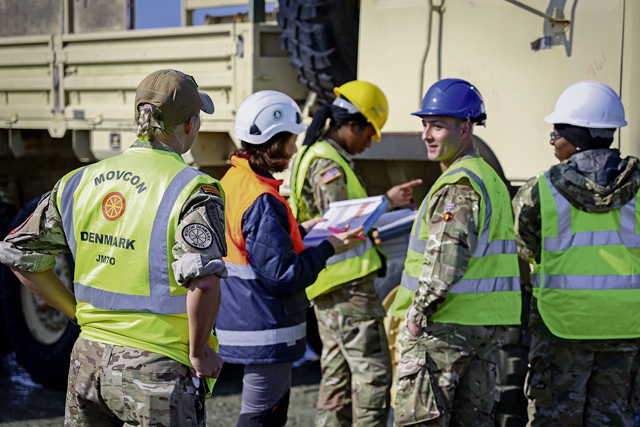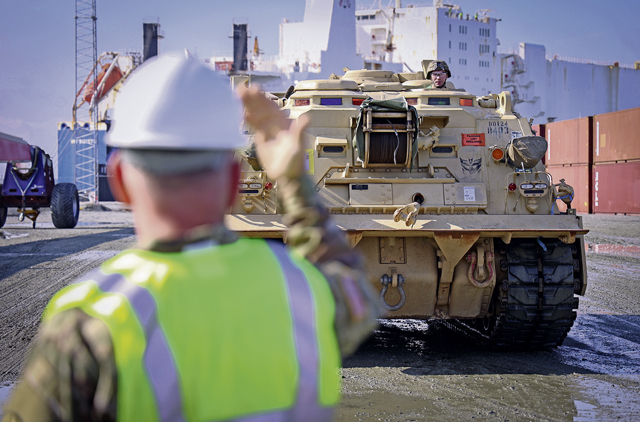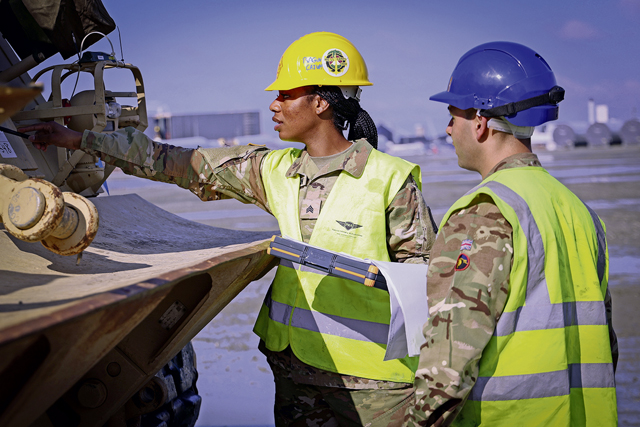
ESBJERG, Denmark — The Motor Vessel ARC Endurance delivered an estimated 800 vehicles and pieces of equipment, including the M1A2 Abrams SEP-V3, M2 Bradley, and the M88A Recovery Vehicle, belonging to the 2nd Armored Brigade Combat Team, 3rd Infantry Division deployed to Europe, at the port in Esbjerg, Denmark, on Aug. 25. The 2/3ID ABCT, stationed at Fort Stewart, Georgia, replaces 2nd Brigade Combat Team, 1st Cavalry Division, stationed at Ft. Cavazos, Texas, as part of a regular rotation of forces to support the United States’ commitment to Operation Atlantic Resolve.
“The United Kingdom and the United States have had a successful, long-running partnership,” said Brig. Gen. Ronald Ragin, commanding general, 21st Theater Sustainment Command. “This operation is a significant milestone in that partnership because it demonstrates both the 104 Logistic Support Brigade and the 21st Theater Sustainment Command’s ability to plan and execute combined operations. Similarly, Denmark is an original NATO ally. Its willingness to host both the U.S. and the U.K. in support of this and future operations clearly demonstrates its commitment to NATO and its positive relationship with the U.S. military.”

Soldiers from 21st TSC’s 386th Movement Control Team, 39th Movement Control Battalion, and in coordination with the 598th Transportation Brigade (Surface Deployment and Distribution Command), 104 TEG, Homeguard District South and Southern Jutland, and commercial organizations discharged the vehicles and equipment, efficiently executing its reception, staging, and onward movement.
“It’s been wonderful working with our Danish and British partners, having a Danish soldier tied in with us, seeing how we do things and explaining how they do their operations,” said U.S. Army 1st Lt. Julia Johnston, acting port operations officer in charge with the 386th Movement Control Team, 39th Movement Control Battalion. “Even with the United Kingdom, to see what and how they’re doing things and how they manage a port operation like this, you get to learn a lot about their culture and military, making building those relationships possible.”
Interoperability is a crucial notion in the military; having relationships between Soldiers from other countries makes NATO operations a success and allows the workflow to be smooth and cooperative, allowing for a constant progression of each tasked mission.

“There’s been a lot of interoperability between ourselves, the Danish, and the Americans, especially with the Defender operations over the previous couple of years,” said British Chief Warrant Officer2 Adam Gallagher, 29 Regiment Royal Logistic Corps movement controller. “During missions like these and working together, we’re improving our personal and working relationships, understanding how each unit works, how each Army differs and learning best practices from how we all do things differently. It makes missions like this a success, and it makes it easier to plan for and execute in future understandings of how each role differs from the British, Danish and U.S. Militaries.”
Each country has its appreciation for understanding and pushing to develop and maintain working internal relationships between each of the present militaries, and as they develop, successful operations become a repetition to ensure success is inevitable for these participating militaries.
“The internal relationship between all three countries is very crucial, no doubt,” said Danish Lt. Col. Tobias Tesch, commander of the Homeguard district South & Southern Jutland. “However, this is the ninth time we have received ships within the Esbjerg harbor and have very good cooperation, both with the British and U.S. forces. [We are] consistently trying to develop and even improve our relationships on a daily basis and during operations.”

The Esbjerg port operation also demonstrated that the U.S. Joint Forces provides proactive and scalable options for priority missions.
The 2/3ID ABCT “Spartans” will fall under the command of the U.S. Army V Corps. Also known as “Victory Corps,” V Corps is America’s forward-deployed corps in Europe and works alongside NATO Allies and regional security partners to provide combat-ready forces, execute joint and multinational training exercises, and retain command and control for all rotational and assigned units in the European theater.
Since April 2014, U.S. Army Europe and Africa has led the Department of Defense’s Operation Atlantic Resolve land efforts by bringing units based in the U.S. to Europe on a rotational basis. Deployed units are ready, combat-capable forces able to conduct extensive bilateral, joint, and multilateral training throughout their deployments to more than a dozen European countries. Moreover, Operation Atlantic Resolve enables the U.S. to enhance deterrence, increase readiness, and support NATO.


